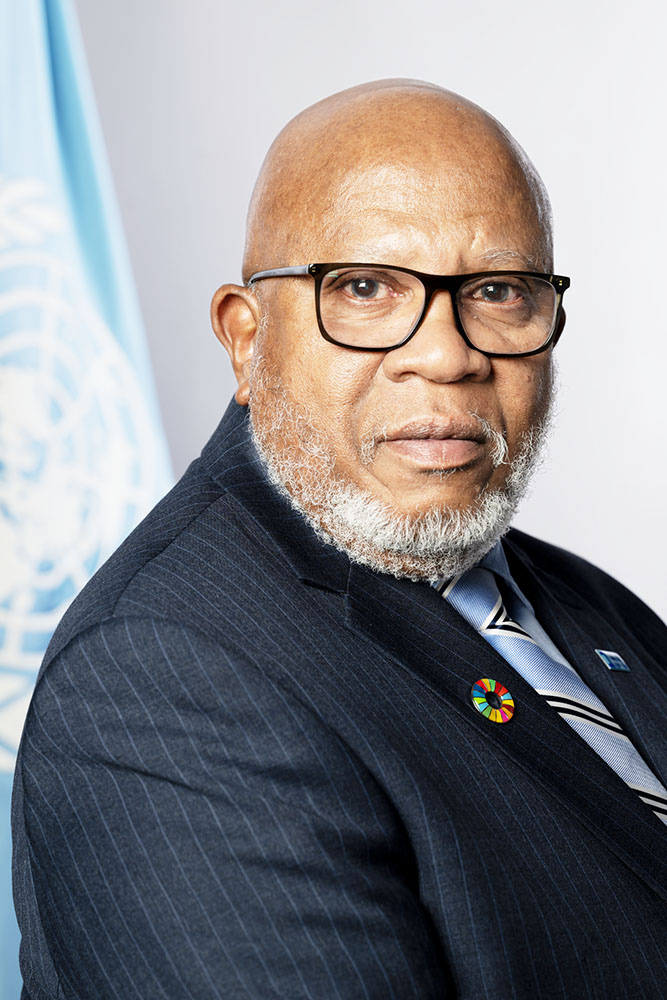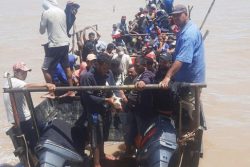By Khadidja Ba
During a media briefing at the UN House yesterday in Kingston, visiting President of the UN General Assembly (UNGA) Ambassador David Francis said Guyana has the option of presenting a case to UNGA in the event of any escalation by Venezuela over the border controversy with this country.
His response came after a lengthy pause before answering the Sunday Stabroek’s question about what actions Guyana could take at UNGA if Venezuela’s threats over the border controversy came to fruition. He noted that the boundary controversy between Guyana and Venezuela is currently under review by the International Court of Justice (ICJ), and it is important to allow this legal process to unfold.
However, Francis, a Trinidadian, noted that while the General Assembly could issue a resolution, the specifics would be the result of negotiations among its 193 member states. He suggested that Guyana’s stance of not provoking the situation might influence the resolution’s content. In the last quarter of last year Caracas ratcheted up tensions with this country, deployed troops and weaponry to border zones and held a referendum on whether to annex Guyana’s county of Essequibo. It later purported to pass a law to do this.
Earlier in the briefing yesterday, Francis emphasized the importance of resolving Venezuela’s internal issues over its recent elections peacefully. He expressed hope that the Venezuelan people would find ways to de-escalate tensions rather than exacerbating them. He warned that heightened tensions could lead to severe internal and external consequences. Francis urged all parties to engage in open and honest dialogue to address the crisis without resorting to violence.
“Peace and security are the core principles of the UN,” he concluded, underscoring the organization’s commitment to resolving conflicts through diplomatic means.
Asked what had been the highlight of his term so far which will come to an end later this year and the low point, Francis said the focus on the sea level rise has been the high point while the war in Caza has been the nadir.
With his presidency set to conclude on September 10, 2024, Francis shared key accomplishments and challenges faced during his term.
One of the major highlights of his presidency, according to Francis, has been his focus on sea level rise, a critical issue for small island developing states and low-lying coastal areas such as Guyana and Suriname. Francis emphasized that the accelerating pace of sea level rise, driven by melting glaciers, poses a severe threat of submersion for these vulnerable regions. He noted the rapid inundation of places like Tuvalu and pointed out that some Pacific nations have already negotiated agreements with other countries, such as Australia, for potential population relocation in the event of complete land submersion. This, he remarked, could result in a loss of culture, language, and identity.
Warranted
Francis acknowledged that the General Assembly had not previously addressed this issue with the urgency it warranted. However, he expressed satisfaction that the Assembly has now prioritized it and will consider it at the upcoming high-level meeting, where Heads of State are expected to provide directives on how the UN should tackle sea level rise.
The ambassador underscored the significance of this issue, particularly for Caribbean nations, and stressed that the global community—including countries like Indonesia, Thailand, the USA (notably South Florida), Hawaii, and Guam—must unite in assessing the risks and taking collective action.
On a sobering note, Francis also reflected on the devastating humanitarian crisis in Gaza following the ongoing war by Israel. He expressed deep concern over reports of babies undergoing amputations and surgical procedures without anesthesia due to a dire shortage of medical supplies. The war in Gaza, he noted, has inflicted severe suffering on women and children, with the toll rising to approximately 39,500 lives lost. This situation, he said, is a tragic consequence of an avoidable conflict.
During his visit to Guyana from August 7 to August 10, 2024, Francis engaged in a series of meetings with key figures including President Irfaan Ali, Vice President Mark Phillips, and several government ministers. He also met with members of Parliament, UN representatives, and various diplomatic and community leaders. Discussions covered a range of topics, including misinformation in the digital era with youth and the work of the National Agriculture Research and Extension Institute (NAREI) and women’s groups.








